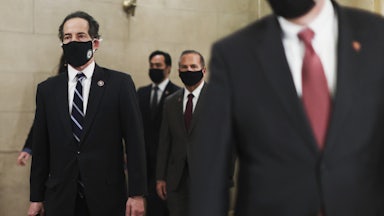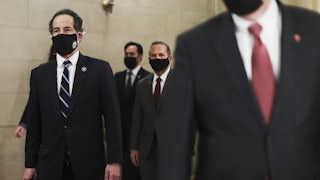Who edits The New York Times? This is not, at least at first glance, a particularly complicated question. Dean Baquet has been the executive editor of the newspaper of record since 2014, a period of profound growth, when the company amassed six million subscribers (it had about 1.5 million the year Baquet took over). While The Washington Post has made strides in recent years, the Times is still an agenda-setting newspaper like no other. In recent years it has become an industry-swallowing behemoth, hiring whoever it wants whenever it wants, while dominating a number of media formats—audio, visual, and, of course, text.
But the question “Who edits The New York Times?” has taken on a different dimension in recent years. While the obsession over the Times’ foibles and fuck-ups has long been a cottage industry, it is now firmly entrenched in the culture wars. According to the anti-woke contingent, the Times is increasingly run by a pitchfork-wielding mob of scolds demanding ideological purity and adherence to faddish identity politics. Last year, in the wake of a controversial op-ed by Senator Tom Cotton calling for troops to quell violence associated with the George Floyd protests, the mob was able to force out the paper’s opinion editor (who was pushed out) and a controversial employee (who resigned). This mob, the argument goes, is holding the rest of the paper hostage. Baquet is only nominally in charge.
On Friday, there were anti-woke howls across the internet after the Times announced that Donald McNeil, a prize-winning health care reporter, was leaving the paper he had worked at since 1976. McNeil had recently received widespread acclaim for his reporting on Covid-19, but a report from The Daily Beast two weeks ago alleged that he had repeated a racial slur in front of teenagers while accompanying a high school trip to Peru. (The Times apparently sends its reporters on these trips, which cost $5,500 each, as “guides.” Fancy!) McNeil had initially been given a reprieve by Baquet but was pushed out after 150 staff members objected to his light treatment in a letter to management. Here was another smoking gun: The paper of record devouring its own on command from a legion of woke, illiberal scolds.
But McNeil’s case is complicated and resists sweeping generalizations, about both the Times and media writ large. What is clear, however, is that personnel decisions at the Times have become an obsession for many, with partisans using the confusion surrounding opaque human resources decisions to argue whatever they want.
In McNeil’s version of events, he made a foolish mistake. He was arguing with the students over a high school’s decision to suspend one of their classmates over a video that surfaced of them using the n-word years earlier. McNeil wanted to know the context—did she call someone the slur or was she merely reciting something she had read or heard, perhaps a song? “I should not have done that,” McNeil wrote in a memo to staff. “Originally, I thought the context in which I used this ugly word could be defended. I now realize that it cannot. It is deeply offensive and hurtful. The fact that I even thought I could defend it itself showed extraordinarily bad judgment. For that I apologize.”
In their own letter to staff, Baquet and managing editor Joseph Kahn underlined that McNeil’s language was unacceptable: “We do not tolerate racist language regardless of intent,” they wrote. “We are committed to building a news report and company that reflect our core values of integrity and respect, and will work with urgency to create clearer guidelines and enforcement about conduct in the workplace, including red-line issues on racist language.”
The outrage that has followed McNeil’s departure has focused on the question of intent. McNeil wasn’t using the word in a hateful way, so him being pushed out the door was unfair. The newspaper was also retroactively punishing a reporter by a standard that was adopted quickly and with little forethought. Jonathan Chait, in a New York column, compared it to an anecdotal incident in which a teacher was fired after a decade-old video surfaced of her reading the n-word from a book to a class. In McNeil’s departure, as with the response to the Cotton op-ed last year, Chait writes, “the standard has been formulated in the face of pressure and applied retroactively against staffers who could not have known [it] existed.”
I am, broadly speaking, sympathetic to both of these arguments. I’m uneasy about the attempt to divorce “intent” from speech, and I don’t like standards being applied retroactively. But I’m not sure that’s what’s happening here. For one thing, the fact that McNeil used the slur on a trip for teenagers has received surprisingly little attention: It is, even for a 67-year-old out of touch with the new language of “wokeness,” an odd thing to do. This is not, moreover, a new standard or one that has been suddenly applied—it would have been shocking to hear an adult say the n-word when I entered high school two decades ago, and it would likely have resulted in discipline.
It’s also not clear why he felt it necessary to use the word. Everyone knows what the n-word is; this is not the equivalent of reading it in a book. For all the talk of this being some sort of new-fangled culture-war problem, it strikes me as a very old-fashioned human resources issue. Context matters, too: McNeil was using the n-word in front of teenagers on a work trip. That’s weird! And apparently a lot of people complained about it.
Speaking of context, defenses of McNeil omit a lot of it. The Daily Beast’s report found that students on the trip said that he “made racist and sexist remarks throughout,” that he “used stereotypes about black teenagers” and denied the existence of “white privilege,” and that he was disrespectful, both to students and on visits to Indigenous communities. The letter signed by 150 Times employees cites his use of a racial slur but focuses primarily on a pattern of behavior. It also notes that McNeil “has shown bias against people of color in his work and in interactions with colleagues over a period of years.”
Maybe the guy’s misunderstood, difficult to work with. Maybe he likes arguing with teenagers for some reason. But the additional reporting about McNeil’s conduct, both on the trip and at the Times, complicates the narrative that McNeil’s departure from the Times was simply a question of using a horrible word in an anodyne context.
The details of the incident in question are almost beside the point. The fact is that we don’t know a lot of them, and the controversy is opaque enough that you can use it to say almost anything you want. McNeil’s departure is being used to invert what has been one of the biggest stories in media over the last few years: Media employees demanding more representation are, in this version of events, not only going too far but are actually a huge problem on par with the industry’s well-documented lack of diversity. The slippery slope argument at work here is that the woke mob at the Times has managed to strip mitigating context from one word. It has tasted blood and will now strip it from others. Your innocent use of an idiom could get you fired next!
What really happened to McNeil is secondary—what matters is advancing the idea that The New York Times is secretly being run by a cabal of self-serious scolds. The larger debate over inclusion and representation in media is obscured, even though it is obviously important context.
The lack of diversity in media and the attendant rise of activism within newsrooms is a complicated story, one that defies pat conclusions drawn from isolated instances. The media, it goes without saying, is much larger than just the Times, and the paper’s encounters with workplace activism often say much more about its internal policies and politics than about the rest of the industry, let alone the rest of the country.








